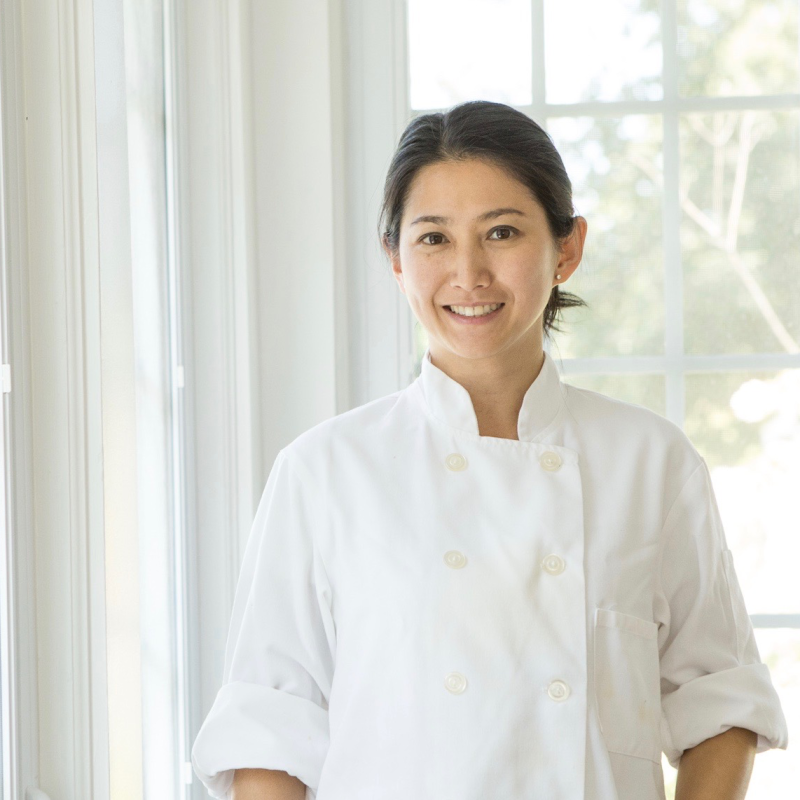Floral Symphony
"The things I’ve learned in music – the creative thinking, sitting down with an ensemble and performing a piece of music from start to finish, not rushing, going at precisely the right pace – it’s all so analogous to the farm season. We’ve got a crew of people, we’re going to go out into this field, we’re going to plant a crop, and as an ensemble, we're going to realize all of the different things that we need to do over the course of the season. The scale of time is a little different in that a piece of music could last five minutes, whereas our season lasts five months or longer."
- Luke Franco, co-owner of Tiny Hearts Farm
This week, we sat down with musician and Tiny Hearts Farm co-owner and farmer Luke Franco. Luke and his wife, Jenny Elliott, both started out as classically trained musicians before becoming full-time organic flower farmers in the Hudson Valley. Luke and Jenny's keen sense of timing, their appreciation for beauty, and their sincere love of what they do have created stunning florals that we've been lucky enough to enjoy and share here at Mast Market.
The story of their journey with Tiny Hearts is just as compelling, and it truly comes together like a whimsical novel at times. We hope you enjoy the conversation below as much as we enjoyed having it, and if you're in the Hudson Valley, be sure to stop by the farm in Copake or the shop in Hillsdale to get your own fresh florals.
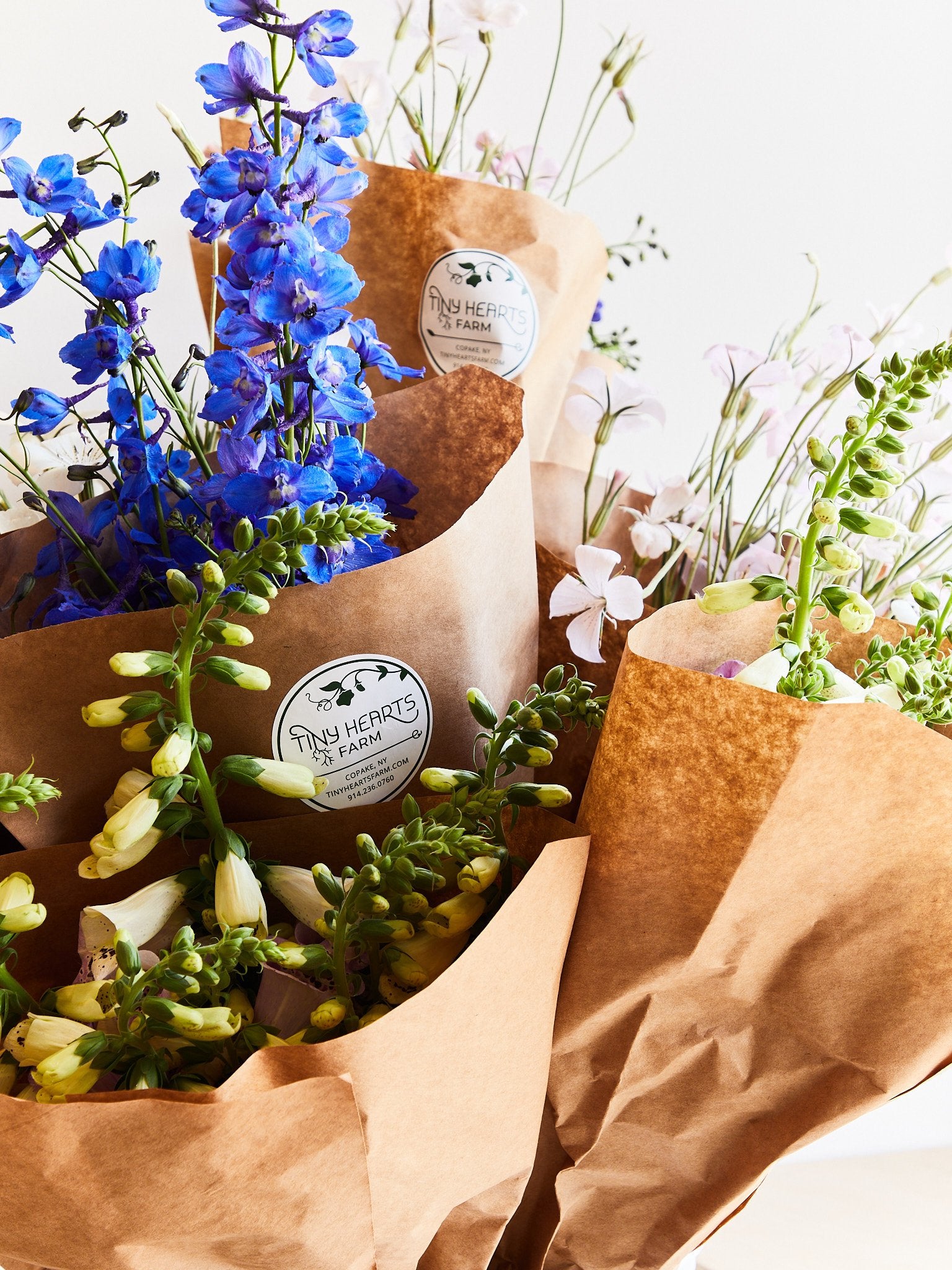
Organically grown flowers from Tiny Hearts Farm. Photography by Kate Jordan.
Mast Journal: You and Jenny both have backgrounds in music. Have you found any parallels between music and farming?
Luke: I see them all the time. That might just be the way my brain works, but the things I’ve learned in music – and for Jenny, too – the creative thinking, sitting down with an ensemble and performing a piece of music from start to finish, not rushing, going at precisely the right pace, it’s all so analogous to the farm season. We’ve got a crew of 12 people, we’re going to go out into this field, we’re going to plant a crop, and as an ensemble, we're going to realize all of the different things that we need to do over the course of the season. The scale of time is a little different in that a piece of music could last five minutes, whereas our season lasts five months or longer. So it’s a macro view of some of the same kind of concepts. Music is such a brilliant thing – in my opinion, it’s the truest form of expressing your humanity. And all the things we’ve learned about discipline and practice is just the same as keeping weeds off of beds, working with a team, so much more.
Mast Journal: I’m curious about the backstory of your farm, specifically how Dick Button came to offer you an acre of land in Westchester when you were first getting started.
Luke: Isn’t that odd? He’s a figure skater. He was an Olympic gold medalist and two-time world champion in the fifties. He had a really interesting career – he’s done all sorts of stuff from Broadway to graduating from Harvard law and practicing law, and he also has a wonderful formal garden where instead of planting in straight lines, he plants his rows in the shapes of old figure skating patterns. So there was a program at the time that put together people who had land in Westchester with young farmers who were looking to access land to grow crops. We were connected with him, and basically it was just a handshake lease: here is this one-acre farm, which used to be a pasture for a cow and a horse that hadn’t been cropped in thirty years, and he said we could use it. Jenny, by the way, is an Olympics fanatic. She loved watching figure skating, so when she heard it was Dick Button, she knew exactly who it was and she was really pumped about it. So sometimes he would walk down to the field and he’d kind of be a little mischievous and give us a bit of a hard time with this Olympic sparkle in his eye, and it was a great motivator in those early years when it was very hard to get started.
Mast Journal: Did you both always have green thumbs?
Luke: I would say yes for Jenny. She was always working in the garden at her mother and father’s house. When she was a girl, she used to send away to receive a catalog from a dahlia farm just to look at the pictures. And then we both got into music and went to school and were living in the city, and it just didn’t connect with her. After we left the city, she got a job on an organic vegetable farm. She always says she didn’t realize farming was a career option. It’s not really one they present in school, at least not traditional schooling. So when she worked the first day, she always describes it as being rainy and miserable and she was rigging rocks out in the mud, and she absolutely loved it.
As for me, it’s a little different. I wouldn’t say I ever really had a green thumb. I’ve always been a musician first, but one day when Jenny was starting the farm with Dick Button, she said, ‘I’m gonna do this – with or without you!’ [Laughs]. And I said, ‘Well, I guess with!’ I’ve always been kind of this facilitator that helped take care of the things that need to get done. Farming is such a complex organism – it’s not just about the one thing which everybody thinks it is, which is growing crops. There’s so much more to it. There’s the tools, the equipment, the maintenance, mechanic skills, rough carpentry, plumbing for irrigation, building greenhouses, electric work. The list goes on and on. And then there’s also the business part – hiring people, managing people, keeping the books, sales and marketing. So I’d say she’s the green thumb for sure.
I always joke with people that it’s been a dream of mine to have a small garden – instead I’ve got this huge farm [laughs].
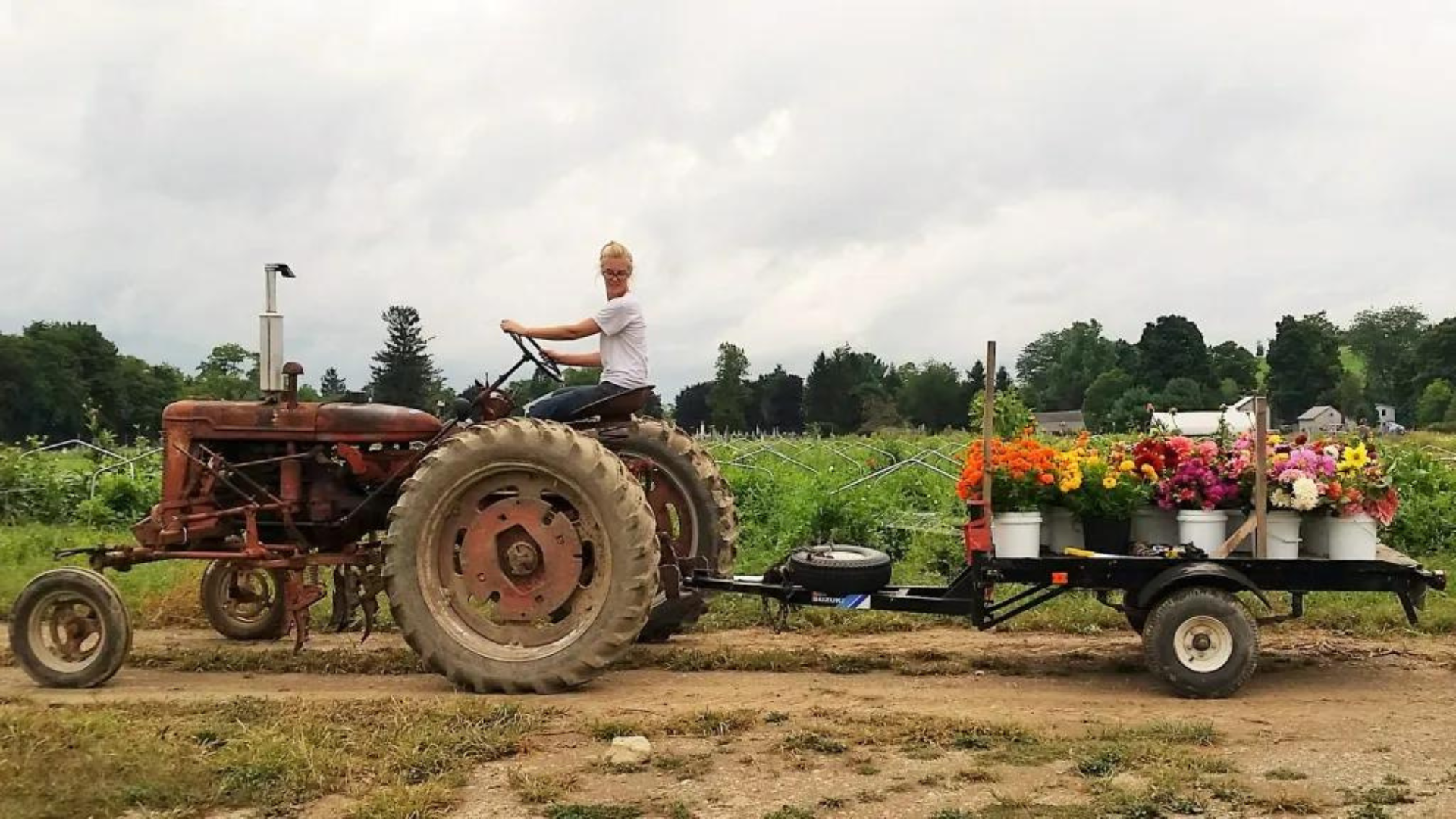
Jenny Elliot, co-owner of Tiny Hearts Farm. Photo courtesy of Tiny Hearts Farm.
Mast Journal: Why did you switch to exclusively growing flowers? Was there a clear moment when you realized flowers were what you wanted to focus on?
Luke: We were starting our farm in Westchester, and the piece of land that we walked onto at the time didn’t have potable wash water. The decision we made was to grow all sorts of crops that didn’t need to be washed. So that first year, we did a lot of tomatoes, eggplants, peppers, beans, herbs, and cut flowers. As we were trying to get into farmer’s markets, they didn’t really want another mixed veg farm. When we mentioned flowers, they said, ‘Yes! You can be my flower vendor.’ So that’s what we became. By year three or four, we decided we were just going to specialize in flowers. There’s such a huge learning curve of figuring out how to grow these really fantastic, harder-to-grow varieties, like lisianthus that have ten blooms per stem and are four feet tall – spectacular, and notoriously hard to grow. We knew we couldn’t divide our attention and really needed to focus on our flowers and get really good at this.
Mast Journal: What, for you, is the most challenging part of the entire flower farming process?
Luke: Jenny and I have been finding that it’s being the key people in charge. We’re still a small farm, but we’re on the larger side of the scale. We’re at about 35 acres, and a lot of people that are part of this movement are between one and two acre farms. We’re ten years in, and we find ourselves basically having to constantly fill in wherever there are gaps. For example, recently I’ve been the delivery driver right now for Mast until I was able to find someone else to take over that route. Now, I’m taking over some New York City stuff, and we have a retail flower shop in Hillsdale so keeping that staffed and managed is important. It’s basically asking, ‘Where is the space that I need to fill in?’ Sometimes we end up working really long hours as a result. Also, you’re working at home, so you’re always at work. There’s always something to do on a farm. So it’s finding that sort of balance, and where are the boundary lines? Sometimes you can set boundaries for yourself, but the farm has its own needs. We’re very serious when we make a promise and take an order, like, ‘Yes, we will have flowers for your wedding day.’ That’s a sacred commitment. So we don’t play around with that.
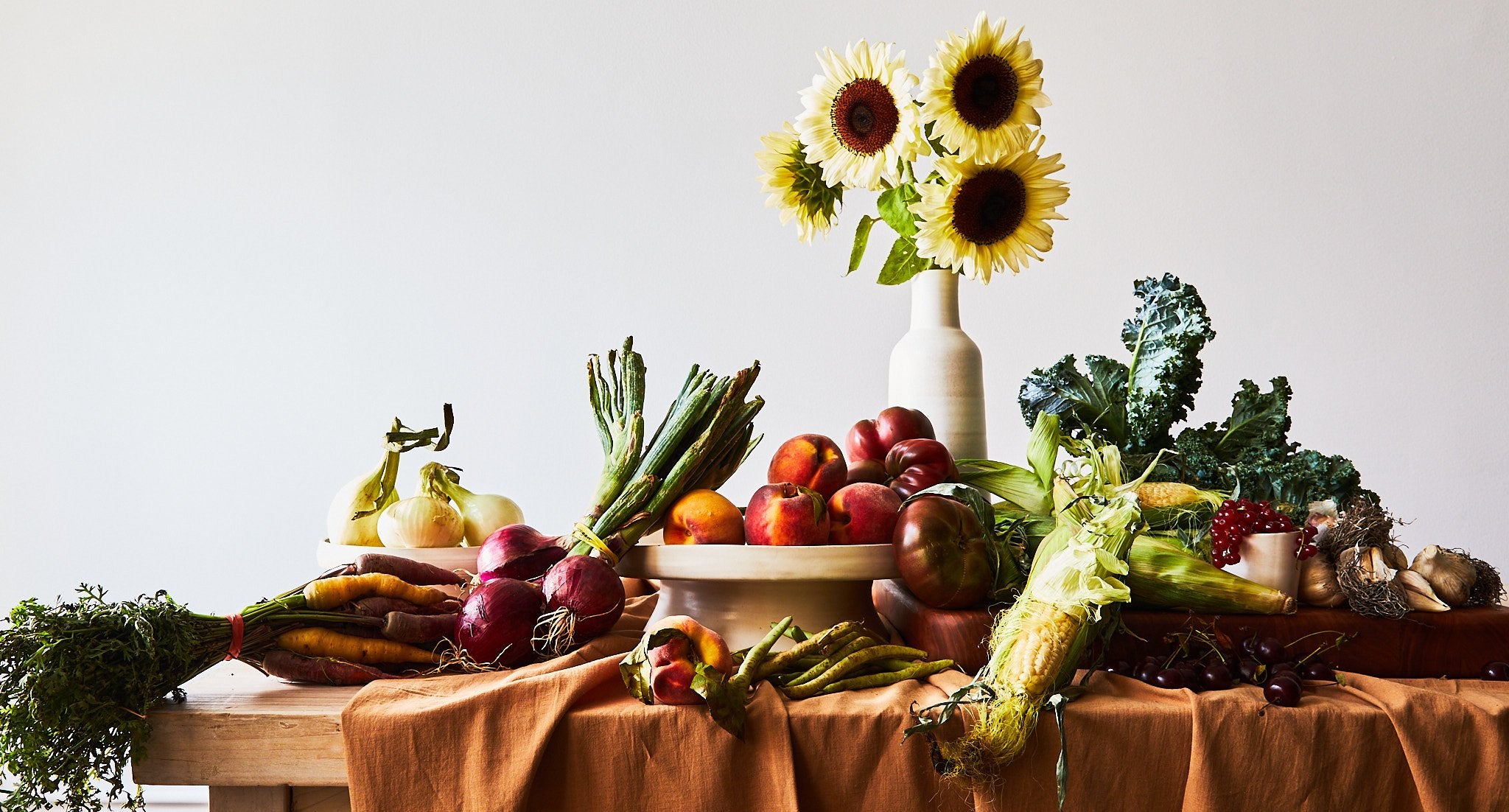
Sunflowers from Tiny Hearts Farm surrounded by the bounty of Hudson Valley. Photography by Kate Jordan.
Mast Journal: This might be an impossible question to answer – do you have a favorite flower?
Luke: Yes! It changes through the season. Not all flowers are available at all points of the year. Right now, my favorite flower is lisianthus. It’s fantastic. It’s like a magical flower. It lasts two weeks, we got it to grow really tall, and it’s super hearty and lovely. That’s a real winner. Another one we really love is dahlias. They come in all sorts of different shapes and sizes. There’s this amazing dinnerplate dahlia called Cool Luke – I love that one.
Mast Journal: What’s your favorite part about what you do?
Luke: For me, in a way, farming is a political act. It’s not this clear, predefined career choice that schools are pushing students to get into. Farming in the style and way that we do, which is using organic methods and practices, is also an affront to some of these modern-day advances. So I really like the independence that we find in this sort of career path. We’re in the driver’s seat of what we can do. Our goal has always been to create a beautiful place, where we like to live and work, and where our employees like to live and work, and to surround ourselves with people who enjoy this work. And to take that beauty that we create here and to share it with our customers, and to spread the joy that we find on the farm with everyone else – that’s what it’s evolved into.
It’s so ironic to me, because the name “Tiny Hearts Farm” came about after Jenny worked on an educational farm for a few years. She found that when the hordes of visitors came to the farm, they would often step on her newly-seeded carrots, or trample her beds, and after a year or two of that, she got a little disgruntled. Her coworkers told her, ‘Jenny, you have the tiniest little heart of anybody I know.’ And she said, ‘You know what? Later on, I’m going to start my own farm, and it’s going to be called Tiny Hearts Farm, and there are going to be no visitors allowed!’ [Laughs]. Well, just the opposite has happened. One of the things that’s really been important to us is sharing this kind of beauty and joy with the community. We have fun with it.
More from The Journal
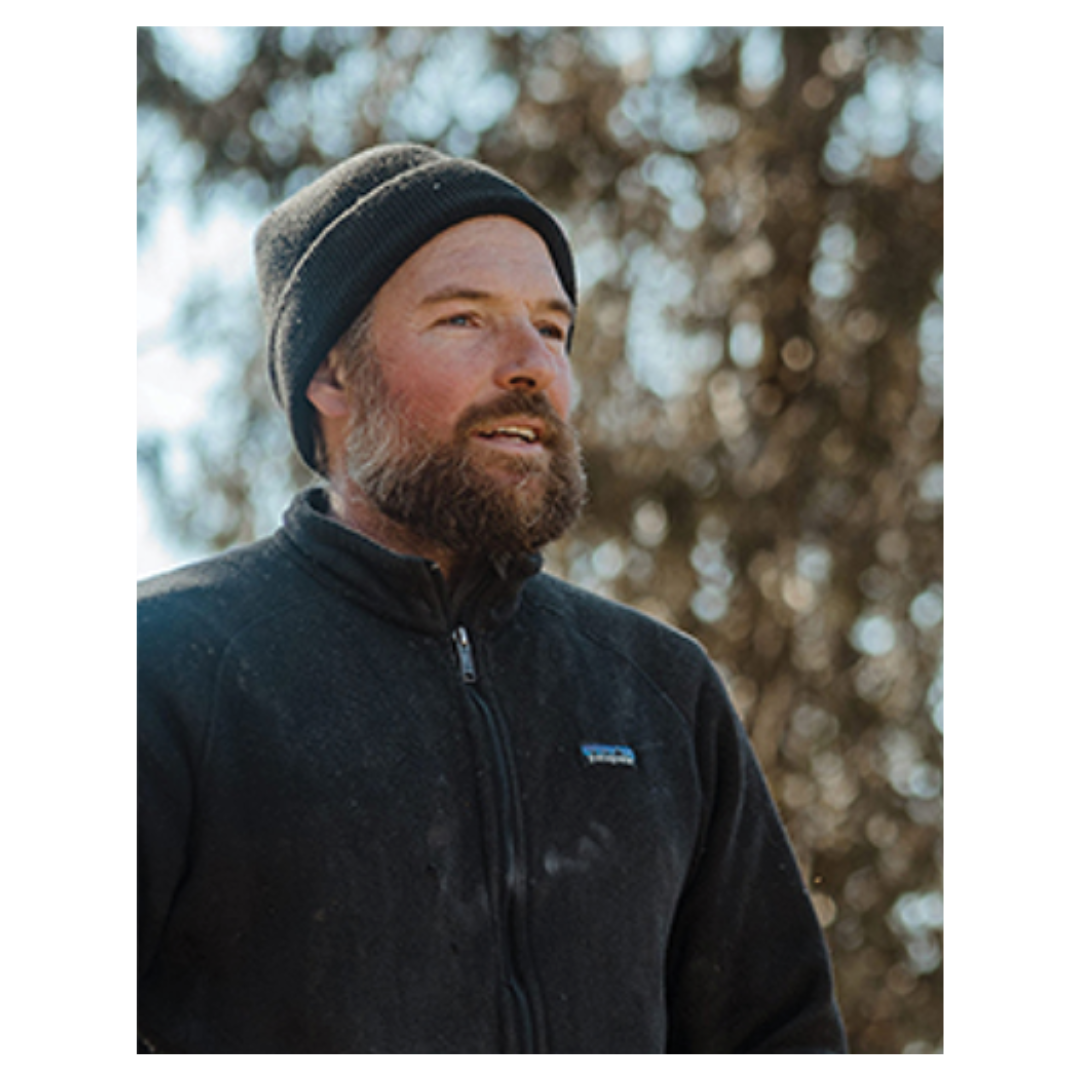
In conversation with Hawthorne Valley’s farm manager, Spencer Fenniman.
Read more
